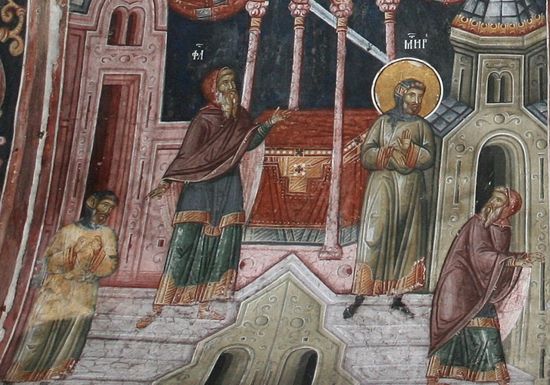At a minimum of once a year, but in fact more often, we remember the Pharisee from the parable told by the Savior. We mainly remember it in order to reproach people not with unchristianity, but namely with their pharisaical relationship to their neighbor. The basic signs of such a relationship are: self-exaltation to high heaven over one’s own virtues, praising oneself for them, denigrating all the sinners around one, guessing at, and subtly, captiously and contemptuously viewing their weaknesses and vices. Also, over-attention to the externals and neglect of the internal. And we often say of someone, “Well, he’s such a pharisee!” Or, “what phariseeim!”
But I think about the Pharisee in the parable and for some reason I feel sorry for him. Not only because he left the temple “less justified” than the publican, although that’s also why. What do we essentially know that is so bad about him that we’ve been attacking him for these two thousand years, haven’t given him any peace, but are continually remembering his unkind words? What is it specifically? This: He is a “pharisee.”
But could there be anything good about that word? Perhaps we can find something positive in this “less justified” man?
In my opinion, we definitely can.
I fast twice in the week, I give tithes of all that I possess…” What is so bad about that? And what is so bad about the fact that he is not as other men are, extortioners, unjust, adulterers? Only that he is saying it about himself, giving testimony about his own self… But he also gives thanks for this: God, I thank Thee... That is, he apparently understands that if it weren’t for the Lord he could not have endured in his goodness, or been able to have done a single one of these virtuous things he’s talking about.
Yes, it goes without saying that he sins in that he allows into his heart this self-exaltation over “other men”, especially over the publican who is weeping about his own sins, and whom God has already justified because of those tears. But couldn’t there be some reason for us to at least partially, at least a little, justify the Pharisee? When you are laboring, performing ascetical feats, refraining from sin at least in deed, it is so easy to fall into judgment of others! The enemy does not leave you alone, but constantly tempts you with the vision of other people’s sins, obvious and in detail. And no less obvious and detailed is the vision of your own ascetic labors. Furthermore, “righteous” wrath will be born in your heart at the contemplation of others’ lawlessness; after all, the doer of iniquity not only shames mankind’s high calling, he grieves God with his sins! How can you help but get angry with him for this, when you yourself fear grieving the Creator more than anything, and consider such a thing to be the worst unhappiness that could possibly be in life? Well, the Pharisee, poor man, stumbles on that very bump and falls. And we’re so happy to nail that accursed man to the pillory…
Only… why are we happy about it? Couldn’t it be because we almost always feel like “stigmatizing”, “sentencing” someone, or at least downgrading him? After all, as soon as we agree to the thought that someone is bad, good for nothing, we ourselves turn out to be not so bad and good for something. See, it’s so sweet and gratifyingly habitual for us to judge the Pharisee that way! We can forget about his sufficiently real virtues, not ascribe any value to them (they’re poisoned with pride and self-aggrandizement!), we can be assured that the Lord will never require that external activity from us because we know that the inner work is so much more important! We know this, and… inwardly judge the Pharisee and exalt ourselves over him. And thus we become, by all accounts, pharisees squared, no less.
More likely even more so. It seems to us that we understand: “What a bad Pharisee,” and “what a good publican”, a sinful righteous man and a righteous sinner. But when we encounter on our own life’s path yet another “publican” (that is, a sinner), we are very quick to judge him. Thus do we “save ourselves”: Without having the good deeds of the one nor the humility of the other, we nevertheless exalt ourselves over both, emulating the worst in both, without coming close to the best.
But all this does not mean that we are completely lost. The Lord is merciful, and if there is no other chance for us to be enlightened, then He allows us in many and varied ways to see our own wretchedness and accursedness, our total poverty and weakness, so that despite ourselves we start repeating the prayer not of one or of the other, but our very own: “O God, I thank You that You have granted me to know and feel with my own heart that I and no one else am worse than all. I confess my own badness with contrition, and in this awareness of it I humbly ask for Your mercy.”
Although… Why just our own? Perhaps the Pharisee also prayed just like that soon after the episode that the Lord described? It’s not out of the question. God “desires that all men be saved and brought to a knowledge of the truth.” Not only the publicans but also the pharisees…

